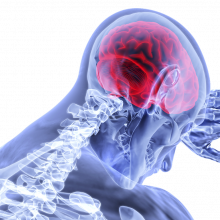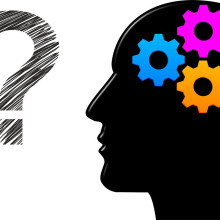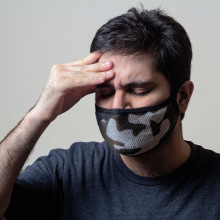Should we stop calling it Long COVID?
4 years since the WHO declared COVID-19 a pandemic officially, we take a look at the latest research guiding scientists towards the root causes of the debilitating symptoms some people suffer for many years after their initial infection with SARS-CoV-2...
In this episode

00:51 - Long COVID can cause cognitive impairment
Long COVID can cause cognitive impairment
Sarah Taylor
Sarah Taylor is a university lecturer who first caught COVID in early 2022 when the Omicron wave of the virus was at its peak…
Sarah - The headache lasted for months and then other symptoms appeared. Stiffness. Getting up and down a staircase was a sheer act of will because I was like the tin man just couldn't really bend my legs. The biggest issue though was cognition. Spatial reasoning is particularly problematic. I go to chair base yoga and I can only do half the session because I've just got so exhausted. But I'm not just getting physically exhausted. The lady is telling me where to put my hands. And as time progresses, I get more and more confused and lose the ability to sort of coordinate my hands. And the brain fog starts kicking in. So it is actually the brain fog more than the physical. That is why I only do half the session. The ability to think is part and parcel of my job. And in the first few months after getting covid, I couldn't think. I couldn't process information, words. I was on sick leave for a year. Some days a text message would be a few words. I couldn't write anything that made sense and I couldn't speak to make sense either. When I got referred to the long covid clinic, I got a swallow test and all that kind of thing, which was very useful because swallowing was an issue. And that has now been largely resolved. But no one really worked with me on my cognition and the sort of speech issues.

03:58 - Brain fog from Long COVID leads to 6 point IQ loss
Brain fog from Long COVID leads to 6 point IQ loss
Adam Hampshire, Imperial College London
While many people with Long COVID have reported neurological symptoms like brain fog, there has, until recently, been no objective measurement of how severely people really are affected. That was until a new study from Imperial College London, recently published in the New England Journal of Medicine, found that people experiencing Long COVID saw cognitive deficits equivalent to a 6 point loss in IQ. The lead author of the study is Adam Hampshire…
Adam - We built on the back of one of the largest epidemiological studies that was run in the UK during the pandemic. It was called React, which is the real time assessment of community transmission. And that was a project where they sampled somewhere in the order of about three and a half million people randomly within the general population to see at different points in the pandemic whether they had been infected with the virus and whether they had covid or not. So we kind of got this background on people's history of covid if you like. And what we did is we recontacted 800,000 of them and asked them to take part in an online cognitive assessment on a platform that's called cognitron that can measure different aspects of cognitive and memory ability through people's laptops, their smartphones. And out of those people we contacted, there's about 140,000, did at least one of our tests and about 112,000 completed the entire assessment.
Chris - How big are the differences that you are detecting? So if I took an IQ test for example, and I was affected in the way that some of the people you registered in the study were affected, how many IQ points down would I effectively be if I were affected in that way?
Adam - If we treat the global score from this assessment like an IQ test, then the group with the largest cognitive deficit is on average people who were in intensive care. And so they showed a difference of around about minus nine IQ points. People who have ongoing persistent symptoms, that is the ones who may have long covid, they perform at about minus six IQ points and that's enough that it could have affected your daily function. You are very likely to be aware and notice that change. The larger number of people of course sit in the short term symptom group and they show a difference on average of about minus three IQ points and that's very small. But we are powered, we are able to detect that because we measured so many people.
Chris - Were there any things that leapt out in people who got SARS CoV 2 infection where certain elements of cognition were consistently impacted or is it just an across the board reduction for at least a period of time in everybody?
Adam - In terms of aspects of cognitive ability, we saw the strongest relationships with having had Covid 19 in memory function reasoning and what we call executive function things like planning. That's the case. If we were looking at, for example, people who had longer term sort of ongoing persistent symptoms. So what some people would refer to as long covid
Chris - And critically, when a person says they get better, because we know that a proportion of people have symptoms for a certain period of time and then they get better. When they get better, does their cognition go back to normal? Do you think?
Adam - We have to be very careful here in terms of the inferences that we draw. What we're looking at are essentially associations. We are not looking at change because we have only measured one time point. Nonetheless, the pattern of results that we see shows that people who have ongoing persistent symptoms perform worse than people who have shorter duration symptoms. Whilst that's the case, even people who had short duration symptoms on average showed slightly worse cognitive performance compared to people who had not had covid at all. The really interesting group of people who had ongoing persistent symptoms. But by the time we cognitively tested them, those had resolved. That set of participants performed at the same level as people who had only short-term persistent symptoms. That is only a small cognitive deficit was still evident.
Chris - Well that's slightly encouraging, isn't it, because it notwithstanding the fact that this is an association would argue that there should be an improvement in someone when their symptoms overall subside.
Adam - Exactly. I think on the face of it, our study has some results that were quite negative and not really what we hoped to see. For example, we don’t see any association between shorter duration covid and cognition. And that's somewhat worrisome. It's not what we were looking for or we didn't predict that. On the other hand, it does appear to be the case that people who have long-term persistent symptoms, when those symptoms eventually subside, they may well have some degree of recovery in their cognitive and memory abilities. Another really quite promising result that we had was that actually several of the results in the study converged towards indicating that this association between covid and cognition has reduced throughout the pandemic. So the association was larger for the original virus and for the alpha variant, but by the time we get to Omicron it seems to have been diminished.
Chris - To what do you attribute that? Do you think that's because by that time it's hitting people who've been either infected before and recovered or vaccinated before and are therefore subject to a less severe infection?
Adam - Well, our model takes all of these things into account, but they're quite hard to disentangle because they correlate across time. So of course if you think through the course of the pandemic, different virus variants were dominant. Right? And then in addition to that, partway through they started to roll out vaccinations and approaches to treatments probably improve somewhat as well. Within the model, it would appear to be the case that if a person was vaccinated at least twice prior to their infection, they have a small cognitive advantage relative to people who had not yet been vaccinated. So I think that's one aspect that's probably coming into play and it's very likely that later variants had a lesser impact on cognition as well. So these things aren't mutually exclusive.

11:29 - The debilitating effects of Long COVID
The debilitating effects of Long COVID
Nathalie MacDermott, King's College London
While the robust evidence that infection with COVID can lead to a significant reduction in cognitive ability, it’s still just a small part of the overall picture when it comes to what we’ve come to term ‘Long COVID.’ Nathalie MacDermott is a paediatric infectious diseases doctor from King’s College London; for her, the aftermath of what was, at the time, quite a mild case of COVID has been significant, disabling and quite different from some of the other things we’ve heard about so far…
Nathalie - I was working on the front line during the pandemic. I started at Great Ormond Street in March of 2020 and I contracted Covid probably by the end of March of 2020. Fully recovered from that, went back to work and then at the end of May, 2020, I seemed to get an almost identical illness again. And following on from that illness, I developed nerve pain in my feet and then that seemed to progress to other neurological symptoms and problems walking.
Chris - I knew you straight away because I was watching you on the television at the start of the pandemic. You were a fit, healthy, young woman by the look of it. Is that true?
Nathalie - Yes, that's true. In fact, I think not even two years before I just returned from a massive field work study in Sierra Leone. I used to walk four miles a day. I would run regularly
Chris - And we've just walked into this office together. And you are using crutches and it's four years since you contracted Covid, do you think?
Nathalie - Yes. So I've been using the crutches for probably about a little over three and a half years now. And I wouldn't say that my symptoms have really improved during that time. I think my ability to manage them and deal with them has improved. But the symptoms themselves are pretty much the same.
Chris - You say you get some nerve pain and some other neurological symptoms. So tell us what your life is like now. What's actually happening to you?
Nathalie - I find it difficult to walk. Lifting my feet off the ground is what's the biggest challenge. So at least with the crutches I can kind of use my arms to propel my legs a bit more. But I need crutches to go, you know, a few hundred metres and anything beyond that. I generally use a mobility scooter to get around, but it also affects my bladder and my bowel and leaves me with constant pain in my legs and my feet.
Chris - Is it getting worse, getting better?
Nathalie - Well, it's not clear at the moment. It's not getting better, that I can tell. And I had some investigations recently, which suggests maybe there's been a slight worsening, but I'm not sure yet.
Chris - One thing that people often say to me is that it's really hard to get support to see somebody who can listen to them, to find out about their symptoms, offer solutions to manage their problems they're having better. Is that improving or or is there still a black hole for people who find themselves in a bad state post covid?
Nathalie - I think there's some improvement in people being more understanding of the condition and trying to support people in their recovery. But the problem is I think we don't have any solutions. So while there might be people to see in a clinic environment, so healthcare workers that might assess you, I think there's still long waits for that. But there are people who will assess you and have a bit better understanding of the symptoms. We don't have any answers as to how to manage that other than take things easy and pacing and so on. And obviously that does work for some people. Some people have fully recovered, but we tend to see that in people who got covid later on and they tend to show signs of recovery within the first year and more or less a complete recovery within the first 12 to 18 months. For those of us who had covid at the very beginning and have not really shown any signs of recovery three and a half years in, we just don't know what the outcome is for that. Because if you haven't improved in three and a half years, is something magically going to change overnight that your body just suddenly says, oh, now I'll recover. I think we want to believe that, but I can understand the desperation for various treatments and people trying different things even though there's no good evidence to suggest they work.

15:44 - Why 'Long COVID' is an unhelpful term
Why 'Long COVID' is an unhelpful term
Ben Krishna, University of Cambridge
Given the broad range of symptoms, from brain fog, to fatigue, muscle pains and signs of nerve damage, it’s likely that Long COVID is not one single condition but an umbrella term uniting a host of different syndromes, all with different mechanisms, outcomes and best treatments. I went to see Cambridge University virologist Ben Krishna, who branched out into working on Long COVID during the pandemic. He agrees that “Long COVID” can be an unhelpful term…
Ben - So the problem with the terminology of long covid is just that it's a very broad and umbrella term. You can imagine three different people. You've had one person who was very, very sick with COVID-19 in 2020. They went to the hospital, they were put on oxygen, they were given what we call mechanical ventilations. They essentially had a tube put into their lungs and then their lungs were inflated artificially for a certain amount of time. And then eventually they've recovered and they've been discharged from the hospital. And you're thinking six months later, are they feeling back to where they were before COVID-19? The answer is probably no. But is that really Long COVID or is that really just them slowly recovering from the initial infection? You then have person two, they lost their taste and smell that hasn't come back for whatever reason. I don't think we exactly know what causes that yet, but for whatever reason, they can't go to restaurants.
But at the same time, they can go into work and they can do everything they normally do. It's just a taste and smell that's gone. And the third case, and these are perhaps in my opinion, the strangest cases where somebody got sick with COVID-19, they had the similar symptoms that a lot of people are familiar with. So they were in bed and feeling fatigued and most people got better and they went back to their normal lives. And for these people, they just didn't get better. And in some cases, it's been a year, sometimes two years, and these people still feel like the first early days of a viral infection and they just never recovered.
Chris - What do we think the underlying mechanisms of cases like that latter one might be?
Ben - So it's still quite controversial what might be causing it. There is a growing body of evidence that the immune system switches on and then fails to switch off. What exactly is causing that is not entirely clear. It could be, for example, that people got infected with the virus, the virus has infected some parts of their body and is still there at a very low level and is just continually making small amounts of virus. And as a result of this, their immune system is still on and still fighting the virus. And that's what's making them feel sick. Because we know that a lot of what really makes you feel sick when you've got a virus is actually the immune system's response fighting the virus, not the virus itself. Alternatively, it could be something autoimmune. So it could be that the immune system started off fighting the virus and now it mistakenly started attacking a part of the body that it's not supposed to. And actually a lot of long covid does look a bit like autoimmunity. Particularly many patients say they have cycles of symptoms, so they get better and then they get worse and they get better again. Or finally it could be something that we're just not aware of right now. It could be that the immune system is switched on, it's not switching off and it's for some reason that we just don't know about yet.
Chris - How are you trying to get underneath that and find out which of those, or whether all of them are behind this?
Ben - Our research suggested that the immune system had switched on in people who had COVID-19. And in most people it switched off. But in this small group of patients with long covid, it just was still switched on and it was particularly switched on. It was making one particular protein. This protein is called interferon gamma, and it is known to make you feel quite sick. We tried looking for viruses in these patients. So what we did was we took blood samples on these patients and then we just looked for signs that the virus is still there. We didn't find anything in the patient's blood. We were particularly interested in their intestines. So there's some data out there showing that patients continue harbouring the virus in their intestines and it comes out in their poo. That is actually where we're moving at the moment, is trying to understand that side of things.
Chris - If that is the case that either the virus has tickled the immune system and it's stayed locked on in some way, or the virus is hiding somewhere and tickling the immune system from a covert hiding place, possibly the gut. In either scenario, the immune system's overactive, what can we do to turn it off?
Ben - So this is why the mechanism is so important because you might approach those in completely different ways. If you are harbouring a small amount of virus somewhere in your body, you might actually be able to treat long covid by giving people antivirals. Alternatively, if it's autoimmune, an antiviral is going to do absolutely nothing. And actually what you want to do is to give people some sort of immunosuppressants. I have heard that there are clinical studies looking at both of those, but I haven't seen any convincing results one way or the other yet. But that is obviously something that people are very excited by.
Chris - Do you think this phenomenon is unique to SARS-CoV-2, the coronavirus that causes covid? Would other coronaviruses do this? Or more broadly, might all viruses be capable of doing this? So if we had a bad dose of flu, this could happen. And is it just that we got so many people all at once catching SARS-CoV-2, that it disclosed this phenomenon and it's always been there. We just didn't see it.
Ben - You've put it in better words than I could have right there. So yes, it's probably the case that you had this new virus. It turns up no one has any immunity to it. Everybody gets sick all at once. And so you get this big wave of people with what we call post viral syndromes. They're just sick for long periods of time after the virus. There is evidence from SARS-CoV-1 commonly called SARS. That was an outbreak that happened in East Asia, particularly South Korea and Japan and China back in 2003. There were patients there who got sick at the time and they were reporting years later that they still didn't feel better. I have seen some evidence that flus can do this. They had a patient who got Spanish flu in 1919 and were still sick into the 1920s, and they just didn't know what to do with this person. So yeah, there's this view now that maybe all viruses cause this, and if you have a brand new virus that springs across from animals and then causes the pandemic, you are going to get a big wave of post viral illness. And of course that's very worrying because we expect there will eventually be another pandemic. And so trying to understand long covid now might help prepare us for the next one.

22:07 - Were doctors left ill-equipped to face the COVID pandemic?
Were doctors left ill-equipped to face the COVID pandemic?
Nathalie MacDermott, King's College London
Notwithstanding some of these positive developments in our understanding of Long COVID, a one size fits all treatment for the various ways it manifests in people is therefore unlikely to materialise. And it’s a problem that could be with us for many years to come. In the meantime, some of those living with Long COVID feel forgotten, among them medical professionals who were on the front line of the pandemic response. Doctors like Nathalie MacDermott feel they were offered insufficient protection for the danger they were exposed to, and some, like Nathalie, are now living with debilitating long term health problems that impact on their ability to do the job they were trained for…
Chris - Can you do your job still? Because you were on the wards looking after little kids. Can you still do that?
Nathalie - Not really, or not in the way I did before. I would like to keep doing that, but even just to complete my training, which I've just finished, has really cost me from a health perspective. So I might be able to do the research side of my job provided I can get more funding. But the actual full-time clinical component is very difficult for me. I'm looking at maybe moderated job plans, but I can't be the doctor I was hoping to be. And I also am very passionate about disaster and epidemic response and well, I'm just not convinced that many organisations would want to send me out to a disaster zone right now.
Chris - If you can't do your job that you've been training to do, you're aspiring to do and you were good at, does this mean that, you basically can't practise, how is the NHS or your employer looking after you because you were effectively being exposed to a threat. You've ended up with this problem almost certainly because of that threat and succumbed to damage because of it. What do they say?
Nathalie - Well, unfortunately not a lot really. The problem is that because I've come to the end of my training whilst I was in training, obviously there was some degree of protection to help me get to the end of my training. But as with any doctor, when they finish their training, they then need to apply for consultant posts. And it's very difficult for me to apply for a consultant post because I need modifications in place to do that. So essentially I'm applying for a job that I know I can't do without adaptations and modifications to the job plan. And that's a very difficult thing to do. Otherwise I can continue in research and I can apply for research funding. But so far I haven't been very successful at that either.
Chris - But is there nothing occupationally that you can do because if I succumb to an injury at work, then I have a reasonable expectation that someone will make good on that.
Nathalie - Well, I think that the problem is that at the moment there's a lot of to-ing and fro-ing between who made the decisions about the personal protective equipment we were provided with. I think a lot of people don't realise that many of us were working on covid wards with nothing but a surgical mask. I found it ironic that there would be people on the underground who had better PPE on than we were given working with known cases of covid. But no one will quite acknowledge the decision making chain that brought about the blanket policy on PPE. And I believe that our employer had a duty of care to protect us as best they could. I mean, nothing is 100%, but as best they could and that they failed in that regard. But unfortunately, until we get a clear understanding of the pathway of decision making and why those decisions were made, it's very difficult to challenge. But we are now trying to take legal action on behalf of all healthcare workers who may have been very negatively affected by this virus to try and get those answers. As well as for some of my colleagues who are unable to work at all, to find some kind of compensation for them because they've lost their careers and their livelihoods.
An NHS spokesperson said: “Long COVID remains a new and complex condition and it’s important we continue to build an evidence base of proven interventions that can support people to manage their symptoms and aid recovery.
“The NHS has established over 100 specialist post COVID services across England which offer a range of specialist, multidisciplinary support in managing and treating the physical and psychological impacts of long COVID – if you are concerned about ongoing symptoms following COVID-19, please speak to your GP team.

26:45 - Could yoga help with Long COVID?
Could yoga help with Long COVID?
Claire Whalley, Yoga For Life
Might yoga have a therapeutic role to play in helping to rehabilitate people with Long COVID? Many extol the virtues, so, we sent James Tytko off to the Yoga for Life project’s Claire Whalley for some tips on his breathing…










Comments
Add a comment